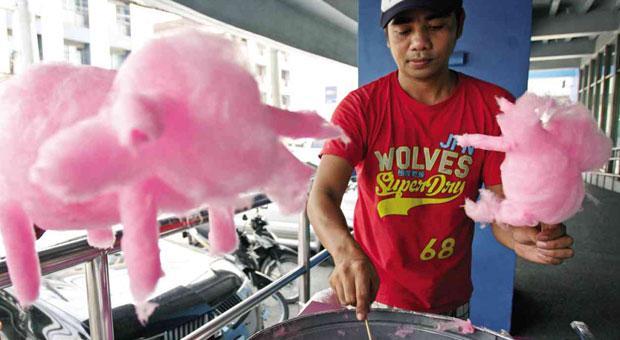This guy has put a new spin on cotton candy.
Arnold Castro, who didn’t get the chance to enjoy the sweet confection as a child, now spends his days spinning sugar into the melt-in-the-mouth cotton candy ― and from the simple formless delight to animal art.
But before he hit the sweet spot, Castro, who grew up in Pangasinan, was a simple printing press employee after graduating from high school. In 1999, he moved to Manila and landed a job as a security guard, first at the Technical Education and Skills Development Authority and later on, in banks.
When he got married in 2000, he realized that his salary wasn’t enough to sustain his growing family. In 2005, he decided to start selling cotton candy.
“Sa cotton candy kasi wala kang masyadong kalaban, kakaunti lang kami (There is not much competition in the cotton candy business. There are just a few of us),” Castro said.
 |
Arnold Castro (Pam Pastor/Philippine Daily Inquirer) |
He was no stranger to the business as his sister’s husband was a cotton candy vendor himself. So whenever Castro was off duty, he would join his brother-in-law as the latter made rounds with his cart in Guadalupe.
But as he made his way around Makati with his own cart in tow, Castro discovered that people didn’t always want to buy the classic carnival fare. That was when it occurred to him that if he wished to earn more, he should do something to make his product more attractive. He then decided to make cotton candy animals.
Eye candy
It took a lot of originality (“Imbe-imbento lang”) for Castro to improvise on the craft. He started with a teddy bear, using a ball of cotton candy as the base before adding the head, ears, arms and legs ― all made out of the same sugary treat that looked like a fluffy mass of cotton. Soon, customers started asking Castro to make other animals. The hardest one to make was the dragon, he said, but not anymore.
It was fascinating to watch Castro work, his stick-wielding hands deftly moving to catch threads of cotton candy before shaping them into animals in mere seconds.
Today, he has a whole menagerie ― he can make cotton candy elephants, dogs, pigs, dinosaurs, koalas and even a tarsier clinging to a tree. He also makes mermaids, angels and pop culture characters like the Minions from the animated comedy Despicable Me and Elsa from the musical fantasy Frozen. But the most fun for him to make is Patrick Star, Spongebob Squarepants’ starfish best friend.
He charges 5 pesos ($0.11) to 10 pesos for each work of art, depending on the size and the design.
Castro has turned street food into art and his skill is quite unique, considering that there are no other cotton candy artists (based on our Internet search), except for the men in China who make cotton candy flowers. None of them makes cotton candy animals.
Castro usually starts his day at 9 a.m. or 10 a.m., often stopping by Nicanor C. Garcia Sr. Elementary School in Olympia, Makati, before moving his cart to Sta. Ana Elementary School. He spends the rest of the day going around Makati.
More lucrative
His route is limited to the area ― the location of the garage where he parks his cotton candy machine at night. At around 6 p.m., he heads home to his family in Taguig.
In his neighborhood, kids wait excitedly for his arrival because he brings them leftover cotton candy.
It’s a venture that has proven to be more lucrative than his old day job, although on some days, Castro just makes enough to cover his costs. He spends on sugar, sticks, plastic bags and alcohol for his cart.
There are days when he just gets back the money he has put in but he makes no losses. On good days, he earns more than 1,000 pesos.
On weekends, Castro is booked for parties by the logistics firm Blue Food Bar, which provides transportation for him and his machine. He does four or five parties a month.
He is a big hit at those events ― just as he was at the Inquirer’s Christmas party for street kids on Nov. 29. His creations aren’t just popular with children; his cotton candy animals make even adults squeal in delight.
His earnings are enough to support his wife, who used to be a “promodizer,” and his three children: Ria, a high school sophomore; Harold, a sixth-grader; and Arnold Jr., a 3-year-old.
Sometimes, when school is out, his kids accompany him to work. When asked if he wants to teach his kids how to make cotton candy, he said, “Ang gusto ko mag-aral sila (I want them to go to school).”
Ria wants to become a teacher and her father, the cotton candy man, is determined to earn enough to make that dream come true.
By Pam Pastor
(Philippine Daily Inquirer)







![[Today’s K-pop] Blackpink’s Jennie, Lisa invited to Coachella as solo acts](http://res.heraldm.com/phpwas/restmb_idxmake.php?idx=644&simg=/content/image/2024/11/21/20241121050099_0.jpg)
